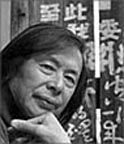Dreams of a Poetic Life by Huang Xiang
by Brian Honigman / November 1, 2009 / 1 Comment

As a Chinese citizen, I cannot publish in China. But I can freely “promote Chinese culture” in the U.S., engage in cultural exchanges, and speak from the lectern at American universities
I am deeply impressed by the openness of American culture, and its acceptance of—and identification with—different cultures. It was so in the past, it is even more so at present. I think of a slim book of poetry titled Gitanjali, which, to the surprise and delight of many Asians, was discovered and embraced by the Western world in the 1910s in a spirit of universalism. It was written by the Indian poet Rabindranath Tagore (1861-1941). As a young man, I was influenced by Tagore as well as the American poet Walt Whitman and the Chinese poet Ai Qing. In the underground “literary salons” that my friend Ya Mo and I founded in Guiyang in the 1960s-1970s, all of us were enlightened and inspired by these and other writers of wisdom.
As a Chinese, I am dedicated to cultivating a culture of freedom in contemporary China, a culture that values exchanges with the U.S. and also values the best of Chinese civilization of five thousand years, including the ancient philosophies; the poetry of the Tang, lyrics of the Song, arias of the Yuan, and vernacular fiction of the Qing Dynasty; the figural art of calligraphy; landscape painting; traditional gardens and architecture; uniquely Chinese apparels; and the life- and spirit-nourishing tea culture. The plurality of world cultures should respect, borrow from, complement, enrich, and identify with one another in peaceful coexistence. For me, promoting Chinese culture and Sino-American exchanges is a spiritual as well as a historical and cultural mission.
I have a Chinese heart of poetry and freedom. I am also a citizen of the world. From my interactions with college students in the U.S., I have discovered that young people today are interested not only in their own ethnic and regional cultures, but also in other ethnic cultures that are exotic but universal at the same time. They are not interested in superficial trends or childish repetitions and imitations between cultures.
For me, poetry in the social dimension is a vehicle of moral responsibility and human conscience. As the zenith of Chinese spiritual culture, however, it has nothing to do with social well-being or the worldly pursuit of fame and fortune. It is the externalization of spiritual life at its purest! It is the true heart and soul! It is the original humanity!
It is being one with heaven and earth, being one with the boundless universe!
This is how I define my aesthetic ideal with Chinese humanist characteristics. It also represents my dream of living a “poetic life,” to be distinguished from the lives of ordinary people and politicians. Its meaning and value lies in revealing an independent, self-sufficient “individual life” in the midst of a muddy world.
Click here to read Huang Xiang’s bio.





One Comment on "Dreams of a Poetic Life by Huang Xiang"
hi. very true statement, please send your poems to http://www.kritya.in
we had a festival of poetry in feb , where we had voices for exile and trama and servival, we know a lots more poets/artists are haveing same voice.
we will like to read yours too.